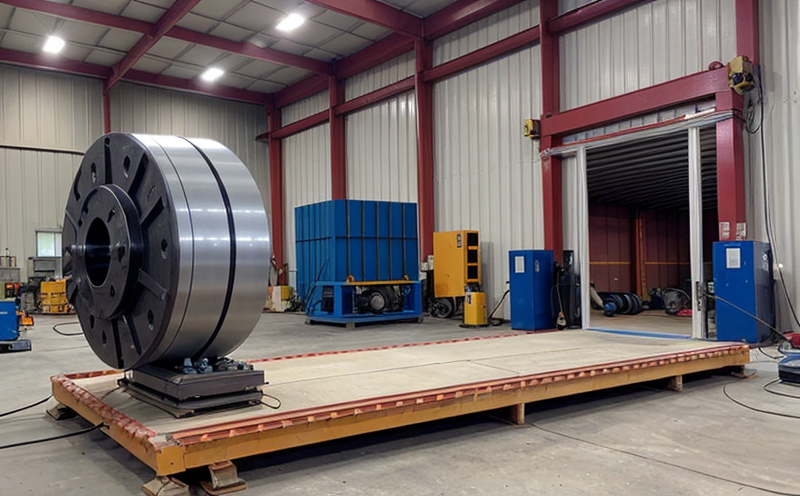ASTM D5276 Dynamic Load Testing of Packaging
The ASTM D5276 standard provides a method for evaluating the resistance of packaging materials and systems to dynamic loads, which are critical in ensuring that the packaging can protect its contents during transport and handling. This testing is essential for industries such as pharmaceuticals, electronics, and consumer goods, where product integrity and safety are paramount.
Dynamic load testing is particularly important because it simulates real-world conditions that packaging may encounter during shipping, handling, and storage. These conditions can vary significantly in intensity and duration, making the use of a standardized test procedure like ASTM D5276 crucial for quality control and compliance with international standards.
The testing process typically involves placing the specimen under controlled dynamic loads to mimic various modes of transport such as vibration from road vehicles or mechanical handling. The goal is to determine if the packaging will protect its contents during these conditions without compromising product integrity.
ASTM D5276 specifies a range of test parameters, including frequency, amplitude, and duration, which are designed to replicate the dynamic forces that a package may encounter in transit. Specimen preparation is critical; it involves ensuring that the packaging is representative of what would be used under real-world conditions.
The instrumentation required for ASTM D5276 testing includes specialized shakers or vibration test machines capable of generating controlled dynamic loads. These devices must be calibrated to ensure accurate and repeatable results, which are vital for consistent quality assurance across multiple batches or suppliers.
After the tests are completed, the data is analyzed to determine if the packaging meets the specified acceptance criteria outlined in ASTM D5276. Acceptance criteria typically involve assessing whether there has been any damage to the package or its contents, and whether the integrity of the seal or closure has been compromised.
Understanding the results from ASTM D5276 testing is crucial for quality managers and compliance officers as it provides insights into how well the packaging will perform in real-world conditions. This information can help guide decisions on material selection, design improvements, and process optimization to enhance product protection.
R&D engineers benefit greatly from this testing by gaining valuable data that can inform iterative design processes, ensuring that new products are robust enough to withstand the rigors of transportation without compromising quality or safety. Procurement teams also find value in ASTM D5276 results as they help ensure that suppliers deliver packaging that meets strict quality standards.
In summary, ASTM D5276 dynamic load testing is a critical component of ensuring product integrity and safety during transport and handling. By following this standard, companies can enhance their compliance with international regulations and improve customer satisfaction by delivering products that arrive in perfect condition.
Why It Matters
The results from ASTM D5276 dynamic load testing are essential for several reasons. Firstly, they provide a robust measure of how well packaging materials and systems can withstand the forces encountered during transportation and handling. This is crucial because even minor damage to packaging can lead to significant issues such as product contamination or spoilage.
Secondly, these tests help ensure compliance with international standards like ISO 22471 and EU regulations for hazardous materials transport. Non-compliance can result in legal penalties and reputational damage. By adhering to ASTM D5276, companies demonstrate their commitment to quality and safety.
Thirdly, the insights gained from this testing allow for continuous improvement of packaging designs. Engineers can use the data to identify weak points and make necessary adjustments, leading to more efficient and effective solutions that better protect products.
Finally, customer satisfaction is directly impacted by the reliability of the packaging tested according to ASTM D5276. When customers receive their products in perfect condition, it reflects positively on the brand and encourages repeat business. In an era where transparency and trust are vital, this type of testing plays a pivotal role.
Quality and Reliability Assurance
The ASTM D5276 dynamic load test is integral to quality and reliability assurance programs. By systematically evaluating packaging under simulated conditions that mimic real-world scenarios, companies can identify potential weaknesses before they become critical issues in the field.
This testing helps ensure that all components of the packaging system—whether it's the material itself or the design of the package—are up to standard. It also allows for early detection of any flaws in manufacturing processes, which can lead to corrective actions and process improvements.
From an operational standpoint, ensuring that packaging meets ASTM D5276 standards streamlines supply chain management by reducing the risk of product damage during transit. This leads to lower costs associated with returns or replacements, thereby enhancing overall efficiency.
In terms of long-term benefits, companies that invest in thorough quality and reliability assurance through ASTM D5276 testing are better positioned to maintain a strong market presence. By consistently delivering products protected by reliable packaging, they build trust among consumers and stakeholders alike.
Customer Impact and Satisfaction
When customers receive products that have been properly packaged according to ASTM D5276 standards, it significantly impacts their satisfaction levels. Properly protected items arrive at their destination undamaged, which not only enhances customer experience but also reduces complaints and returns.
This positive outcome translates into higher customer loyalty and repeat business for companies that prioritize such measures. It also contributes positively to brand reputation, as satisfied customers are more likely to recommend the product or service to others.
Moreover, businesses operating in industries where product safety is paramount, such as pharmaceuticals or electronics, find that ASTM D5276 testing provides an added layer of assurance against potential hazards. This extra precautionary step can significantly reduce liability risks and associated costs.





